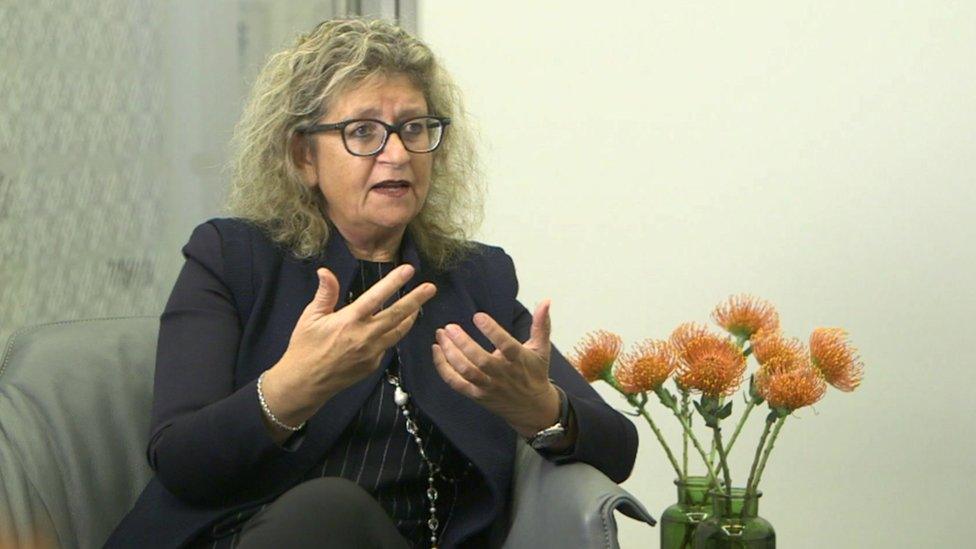Parental alienation: 'I was manipulated by my father'
- Published

"Emma", now 14, was seven when her parents divorced. Over the next five years, she says, her father succeeded in turning her and her siblings against their mother.
"[He said my mum is] a liar, that everything that's happened is her fault, that she doesn't love us, that she's been a bully towards us," she tells the BBC's Victoria Derbyshire programme.
Emma's experience is an example of so-called parental alienation - the deliberate manipulation of a child by one parent against the other parent during a divorce or separation.
Two years after their parents separated, Emma and her siblings went to live with their father.
She says he would deliberately block them from seeing their mother, saying she had "been out drinking the night before and had a hangover, so couldn't be bothered to come [and visit them] any more".
"We were just lied to," Emma says. "With me only being nine, to the age of 12, I didn't know [better]."

Find out more
The Victoria Derbyshire programme is broadcast on weekdays between 09:00 and 11:00 GMT on BBC Two and the BBC News channel.

The turning point for Emma came in 2013, when she received a text message from her mother saying she still loved her.
Emma says she sensed her father may have been hiding the truth, and asked to see her mother.
"He said, 'No, if you carry on the way you're behaving, you'll be put in a foster home, as we won't be able to look after you any more,'" she recalls.

Emma received a text message from her mother, saying she still loved her
Emma decided to run away, on the second occasion managing to reach the home of an aunt, where she spoke, by phone, to her mother for the first time in years.
She now lives with her mother, and has cut all ties with her father.
"How can this man be a father, how can he look after a young child if he's done this," she says.
Calls for legislation
According to the Children and Family Court Advisory and Support Service (Cafcass), 5% of children involved in divorce or separation will experience some level of parental alienation.
In some countries, governments have put in place legislation to prevent such behaviour. In Mexico, parents guilty of alienation can receive a 15-year jail term, while in Italy it carries a fine.
The UK does not have legislation, but judges are starting to recognise parental alienation, leading to some children being removed from the offending parent.

Sandra Davis says mediation would prevent many incidences of parental alienation
Sandra Davis, head of family law at Mishcon de Reya, believes there should be "mandatory mediation, mandatory therapeutic involvement at an early stage" of family court proceedings.
She says this could prevent ill thoughts towards one parent from becoming "too ingrained" in the child, allowing them to have a chance of maintaining a relationship with their parent "before it sours completely".
'Dangerous antipathy'
"Alison" - who has not seen her two boys since her marriage broke down seven years ago - hoped she would receive more support from the legal system when her ex-partner began to turn her children against her.
She says her partner "started making allegations against me that I'd hurt the children".
Alison's relationship with her children quickly broke down. When the case was taken to the family courts, the judge said the children "displayed violent and dangerous antipathy" to their mother - an attitude "fostered" by the father through what he had "shown them and told them".
In an open judgement - while critical of the father - the judge did note he had provided a number of witnesses who broadly attested the boys were happy in his care.

Alison was granted a shared residency order by the judge, giving her equal parental responsibility. But, she says, the courts should have done more to ensure it was adhered to, calling them "toothless".
"The only way to enforce it was for the children to be engaged in some sort of restorative mechanism to ensure they came back to stay with me. But they would have needed support to do so, as their views about me at that stage were so distorted."
The Ministry of Justice says that in cases where an order is thought to have been breached, complainants can go back to the courts, which have the power to impose fines or - in rare incidences of a repeat offence - a custodial sentence.
'I kiss a photo every night'
Alison writes to her children every month, but says the process is "beyond heartbreaking" as she knows so little about them.
"I don't know them now. It's seven years [since I last saw them]. I don't know what their interests are, who their friends are."
But, she maintains, "it's my responsibility to ensure my children know I'm there for them".
"To this day I kiss a photo of my boys on my computer screen goodnight, every night."
Of course, in both these instances the BBC has only heard one side of the story. But for Emma, anyone who believes they may be being manipulated, as she claims she was, should take note of a simple piece of advice: "Follow what your mind says, not what you're made to believe."